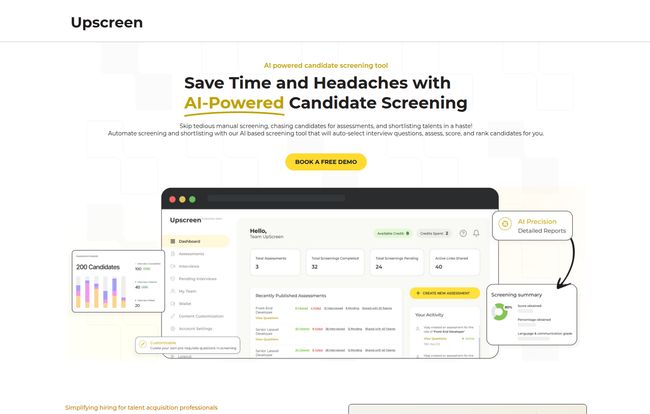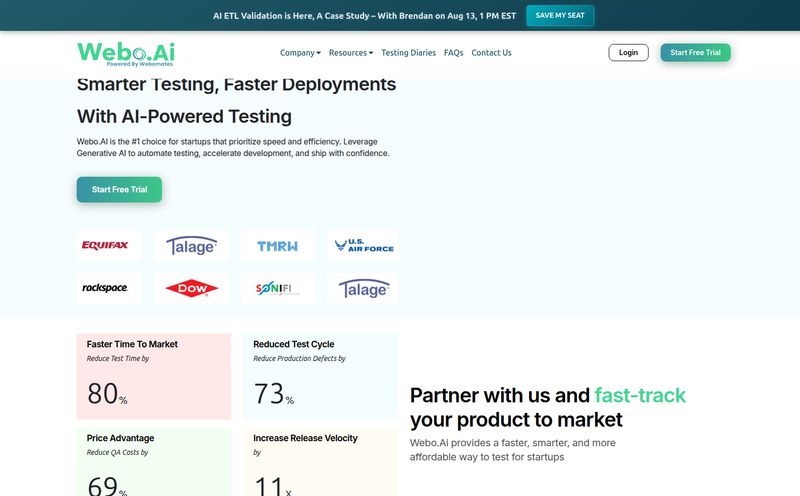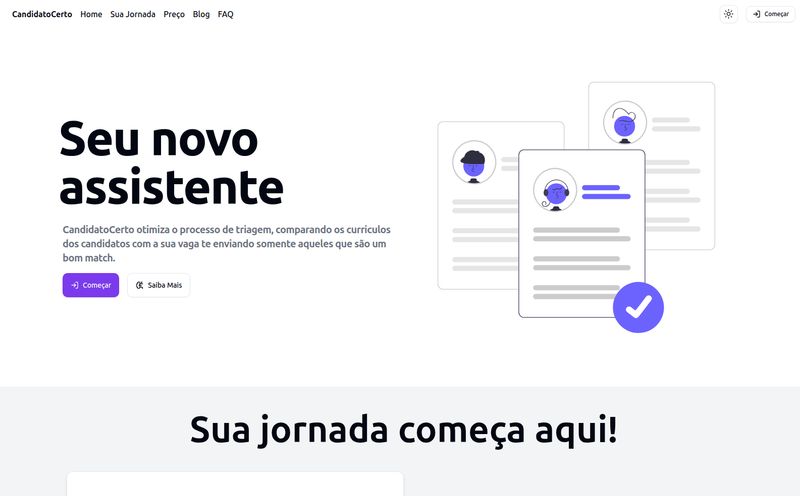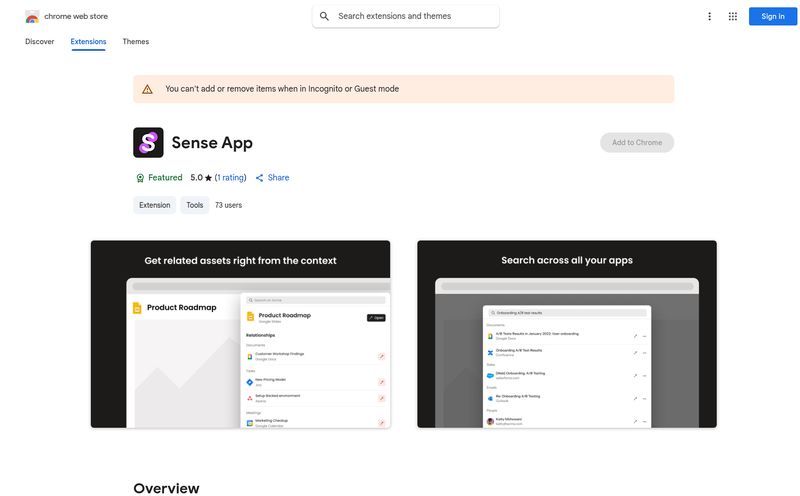If you've spent any time in hiring, you know the grind. It's like panning for gold in a river of mud. You're hunched over, sifting through hundreds, sometimes thousands, of resumes. Your eyes glaze over. Everyone's a "detail-oriented team player with a passion for excellence." It’s a soul-crushing process that often feels more like a lottery than a science. I've been there, trust me. The coffee goes cold, the pile of PDFs never shrinks, and you start to wonder if the perfect candidate even exists.
So, when a tool like UpScreen.ai lands on my desk promising to automate the whole mess with AI, my first reaction is a mix of eye-rolling skepticism and a tiny, flickering flame of hope. Another platform promising to revolutionize hiring? I’ve heard that one before. But this one felt a little different. It’s not just about keyword matching; it’s about AI-driven video screening and analysis. Could this be the pre-screening cyborg assistant I’ve always dreamed of?
So, What is UpScreen.ai Exactly?
At its heart, UpScreen is an AI-powered candidate screening platform. Think of it as the first, tireless round of interviews that you don't actually have to conduct yourself. Instead of you manually filtering resumes and then scheduling phone screens, UpScreen steps in to do the heavy lifting. You feed it a job description, and its AI gets to work, creating a tailored assessment for your candidates.
Candidates get a link to a video interview where they answer a set of questions—some standard, some custom-picked by you. The AI then analyzes their responses, scores them, ranks them, and presents you with a neat, tidy dashboard of comprehensive reports. The big idea is to cut through the noise and deliver a shortlist of genuinely qualified people, saving you from dozens of what the platform calls "unnecessary interviews." A bold claim, for sure.

Visit UpScreen.ai
The Big Promise: How UpScreen Aims to Fix Hiring
UpScreen’s landing page throws some pretty impressive numbers around. They claim they can make the average hiring time 3x faster and cut down on those time-wasting interviews by a whopping 75%. Now, as someone who’s seen more than one project get delayed because of a hiring bottleneck, that sounds like music to my ears. It’s not just about speed, though. The platform is built on a few core pillars.
A Closer Look at the Features
Diving in a bit, the features are what you'd expect from a modern AI tool, but with a specific focus on that initial screening phase. You’ve got the AI-powered assessment, which is the main event. This is the engine that creates the interview questions and then analyzes the answers. It goes beyond just what a person says, supposedly picking up on other cues to gauge suitability.
Then there’s the ability to add custom questions, which is critical. No two roles are identical, and being able to probe for specific skills or cultural fit is non-negotiable. I also noticed they offer white-labeling. This is a bigger deal than it sounds. For recruitment agencies or large companies, presenting a branded, professional front from the very first interaction is huge. It stops the process from feeling like you've been outsourced to a random third-party robot. You can also send out bulk invites, which is a lifesaver for high-volume roles.
Walking Through the UpScreen Process
The workflow seems refreshingly straightforward. On paper, it's a simple five-step dance:
- Upload Your Job Description: This is the starting point. You give the AI the raw material it needs to understand what you're looking for.
- Let the AI Create the Assessment: The system chews on your JD and spits out a set of interview questions designed to test for the core competencies.
- Invite Candidates: You send out a personal link to your applicant pool. They record their answers on their own time. No scheduling nightmares. Hallelujah.
- Check the Dashboard: As candidates complete their video assessments, reports start populating your dashboard.
- Review and Rank: Here’s where you come in. You get to see the AI's scores, watch the video snippets, read the reports, and decide who moves on to the next, human stage.
It’s designed to be a hands-off-until-you-need-to-be-hands-on system. The goal is to transform your role from a resume-sorter to a strategic decision-maker, which is what it should have been all along.
The Good, The Bad, and The AI
Alright, no tool is perfect. Let's get into the nitty-gritty. After looking through the platform and thinking about its real-world application, here’s my take.
What I Really Liked (The Pros)
First off, the sheer time-saving potential is undeniable. Shaving off the initial screening calls for, say, a popular software developer role could literally save weeks of work. The process is automated, and it works while you sleep. That is a massive advantage.
The promise of unbiased and reliable ranking is also incredibly appealing. We all carry unconscious biases, whether we admit it or not. A machine, in theory, doesn't care about a candidate's name, age, or background; it just analyzes the data. This could be a powerful step toward more equitable hiring practices. The evaluation is transparent, based on predefined criteria, which is a world away from the “gut feeling” that still dominates too much of recruitment.
Finally, the comprehensive reports are a huge win. Getting a detailed breakdown of a candidate's performance before you even speak to them gives you a much richer starting point for a real interview. You can skip the basic questions and jump straight into the stuff that matters.
A Few Words of Caution (The Cons)
But here's the thing. While I love the idea of unbiased AI, I'm also wary. AI is only as good as the data it’s trained on. The biggest concern is that an over-reliance on AI might overlook nuanced human qualities. What about the brilliant but nervous candidate who doesn’t perform well on video? Or the one with a quirky-but-valuable perspective that the AI isn't trained to recognize? Charisma, wit, and raw potential are hard to quantify.
There's also the setup. The platform itself mentions that it may require careful setup to align with specific job requirements. This isn't a magic wand you just wave. You have to be thoughtful about the job description you feed it and the custom questions you add. Garbage in, garbage out. If you don't define what you're looking for clearly, the AI will be just as lost as a human recruiter would be.
So, What's the Catch? Let's Talk Pricing
This is where things get a bit mysterious. If you go looking for a pricing page on the UpScreen site, you'll be met with... well, a 404 page. I actually landed on a page for Uplers, an AI Interview Platform, which suggests UpScreen is a product powered by them. It's a bit of a breadcrumb trail.
Back on the UpScreen site, there's no clear pricing table. The primary call-to-action is "Book a Free Demo." This is classic B2B SaaS strategy. It means they want to talk to you, understand your needs, and give you a custom quote. While I appreciate the personal touch, it also means I can't give you a simple number. Based on my experience with similar platforms, pricing is likely tiered. You might see models based on the number of users (seats), the number of open positions, or a flat monthly/annual subscription. You’ll have to get on a call to find out for sure.
Who is UpScreen Actually For?
Is this tool for everyone? Probably not. If you're a small business hiring one person a year, the effort of setting this up might be overkill. But if you're a fast-growing startup, a large enterprise, or a recruitment agency dealing with a high volume of applicants, then UpScreen could be a game-changer. Its a tough gig managing hundreds of applicants for multiple roles simultaneously, and this is exactly the kind of bottleneck-breaking tool that can make a difference. Tech recruiting, sales roles, customer support—any area where you get flooded with applications is a prime candidate for this kind of automation.
Frequently Asked Questions about UpScreen.ai
1. Can the AI be truly unbiased?
In theory, it removes human emotional bias. However, AI can inherit biases from its training data. The key is to use it as a powerful filtering tool, not the final decision-maker. Always have a human review the top candidates to check for nuances the AI might have missed.
2. What kind of jobs is UpScreen best suited for?
It excels in high-volume hiring scenarios where the initial screening is a major time sink. Think roles in tech, sales, customer service, and entry-level corporate positions where you receive hundreds of applications.
3. How much technical skill do I need to use UpScreen?
The platform is designed to be user-friendly. The main skill required is not technical, but strategic: you need to be able to write a clear, concise job description and think critically about what you want to assess in candidates.
4. Are candidates comfortable with video interviews?
It's becoming much more common, especially after the remote work boom. UpScreen's model allows candidates to record on their own time, which is less pressure than a live video call. Providing clear instructions and reassurance can help ease any candidate anxiety.
5. Can I integrate UpScreen with my existing Applicant Tracking System (ATS)?
This information isn't readily available on their main page. It's a critical question to ask during your demo call, as seamless integration is key to a smooth workflow.
Final Thoughts: Is UpScreen the Hiring Revolution We Need?
So, where do I land on UpScreen.ai? I’m cautiously optimistic. I’ve moved past my initial skepticism. This isn't just another keyword scanner. It’s a genuinely innovative approach to solving one of the most tedious parts of recruitment. It won't find you the perfect candidate all by itself, and it won't replace the need for human intuition and connection in the final stages of hiring.
But that's not its job. Its job is to clear the fog. To turn that mountain of resumes into a manageable molehill of top contenders. It’s a tool, and like any good tool, its effectiveness depends on the person wielding it. If you’re a swamped hiring manager or recruiter looking to reclaim your time and focus on what really matters—connecting with great people—then booking a demo with UpScreen seems like a very, very smart move. It might not be a revolution in a box, but it could be a significant evolution for your hiring process.



